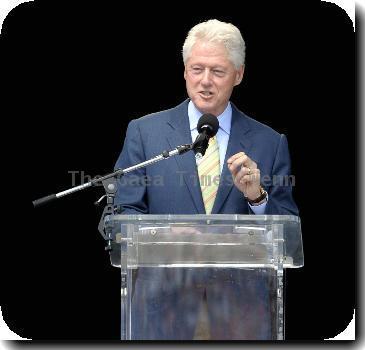Donors pledge $9.9 billion for reconstruction of Haiti in coming years
By APWednesday, March 31, 2010
Donors pledge $9.9 billion for Haiti
UNITED NATIONS — Countries and international organizations pledged nearly $10 billion on Wednesday to rebuild Haiti after January’s devastating earthquake, going far beyond the government’s expectations and providing new hope to the impoverished nation.
U.N. Secretary-General Ban Ki-moon announced that nearly 50 donors pledged $9.9 billion “for the next three years and beyond,” demonstrating that the international community had come together “dramatically and in solidarity with the Haitian people” to help them recover from the quake.
Haiti had appealed for $3.8 billion for the next two years. The U.N. chief said the $9.9 billion includes pledges of $5.3 billion from governments and international partners for the first 24 months of reconstruction.
“We have made a good start,” Ban told a news conference at the end of the daylong donors conference. “We need now to deliver.”
U.S. Secretary of State Hillary Clinton, who co-chaired the conference, called the pledges “an impressive sum by any standard.”
“To put this effort in perspective, after the 2005 (Indian Ocean) tsunami, more than 80 countries provided immediate humanitarian assistance and more than 20 countries pledged assistance for reconstruction,” she said. “As of today, more than 140 countries have provided humanitarian assistance to Haiti and nearly 50 countries have made pledges of support for Haiti’s rebuilding.”
Haiti’s President Rene Preval thanked donors, saying “This is a heartfelt effort that demonstrates that Haiti is not on its own.”
The Jan. 12 earthquake destroyed the government and commercial center of Haiti’s capital, Port-au-Prince. Government-estimated death tolls — which rose without explanation ahead of the conference — range from 217,000 to 300,000 people. Most of the estimated 1.3 million people left homeless are still sheltering on broken streets, hillsides and riverbeds.
Some officials praised the conference as a milestone for both Haiti and international aid efforts.
“I hope what it will do is give confidence to people in Haiti that the international community has not lost interest, they are absolutely there with them, that there is a plan for the future,” U.N. humanitarian chief John Holmes told AP.
But others were skeptical that the aid pledges would be fulfilled.
A spokesman for the aid group Oxfam, Philippe Mathieu, said that after 1998’s Hurricane Mitch struck Central America, less than a third of the $9 billion promised materialized.
“Soon these pledges will need to turn into concrete progress on the ground. This cannot be a VIP pageant of half promises,” he said in a statement.
In the first minutes of the conference, Clinton announced the United States’ pledge of $1.15 billion over the next two years and Catherine Ashton, the European Union foreign affairs chief, announced the EU’s pledge equivalent to more than $1.6 billion.
That totaled more than two-thirds of the $3.8 billion Haiti was seeking.
It was not immediately clear if all pledges were new money, as some delegates appeared to be describing existing aid projects.
Venezuela announced an official pledge total in excess of $2 billion — on its face the largest single pledge. But on closer inspection it appeared that included some money that had previously been given to Haiti. Venezuelan officials themselves seemed unsure.
Aid pledges came from all over the world, sometimes unexpected places.
Oil-rich Qatar gave $20 million; The Gambia promised $1 million. China, which does not have diplomatic relations with Haiti because of its ties to Taiwan, pledged $1.5 million.
Haiti’s sometimes acrimonious neighbor, the Dominican Republic, offered $50 million in a show of solidarity.
Preval asked donors to focus on education and help the country’s 9 million people provide for their own future.
“Let us dream of a new Haiti whose fate lies in a new project for a society without exclusion, which has overcome hunger, in which all have access to secure shelter … (and their) health needs provided,” he told diplomats and ministers from more than 130 countries.
The $3.8 billion is just the initial part of a $11.5 billion package Preval’s administration wants to rebuild schools, hospitals, courthouses and neighborhoods destroyed in the earthquake.
Haiti’s government detailed its plans for the money in a 55-page rebuilding proposal. It includes requests for $350 million in direct budget support to the government, which Edmond Mulet, the top resident U.N. envoy there, said is crucial for the country’s progress.
“We need Haiti to succeed,” Clinton said. “What happens there has repercussions far beyond its borders.”
She said the donors conference was not only to pledge financial support but “to offer support in a smarter way.”
Haiti’s leaders must guide “a transparent recovery,” Clinton stressed, and the international community must change its past practice of working around the government and ensure that it is working with the government.
At the core of the quake-ravaged country’s request for help is the Interim Haiti Recovery Commission, whose board will coordinate and pay out the aid money. It is a key step to allaying donor concerns over Haiti’s history of official corruption and political unrest who want assurances that the money will go where it is intended.
The commission will be co-chaired by former U.S. President Bill Clinton, the U.N. special envoy to Haiti, and Haitian Prime Minister Jean-Max Bellerive.
It is a source of consternation among some Haitian lawmakers who want Preval’s administration to publish a report on how aid money was spent in the initial aftermath of the disaster.
In keeping with his U.N. role, Clinton pushed private investment at the conference.
Most notably he helped shepherd a $7.5 million project with the Coca-Cola Company to help mango producers supplying the “Haiti Hope Mango Lime-Aid” made by its Odwalla brand.
Associated Press Writers Matthew Lee and Edith M. Lederer contributed to this report from the United Nations
Tags: Bill Clinton, Caribbean, Emergency Management, Haiti, Hillary Clinton, Humanitarian Assistance, Latin America And Caribbean, North America, South America, United Nations, United States, Venezuela



